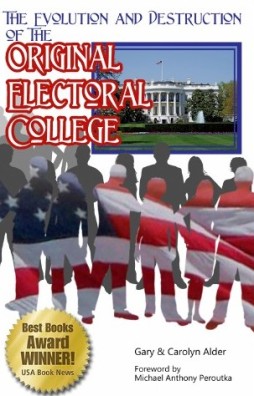A Page from Our Book
Page 28 – Hamilton Defends the System
In Federalist No. 68 Alexander Hamilton explains and defends the Electoral College System. The entire text of Federalist 68 is included with our comments interspersed. Brief comments are included [in brackets] within quoted segments. Clarifying and editorial comments of a more lengthy nature are separate paragraphs:
March 12, 1788
To the People of the State of New York:The mode of appointment of the chief magistrate of the United States is almost the only part of the system, of any consequence, which has escaped without severe censure, or which has received the slightest mark of approbation from its opponents. [Little else in the Constitution has escaped criticism and even received approval from those opposed to its ratification.] The most plausible of these, who has appeared in print, has even deigned [thought worthy] to admit that the election of the president is pretty well guarded. I venture somewhat further, and hesitate not to affirm, that if the manner of it be not perfect, it is at least excellent. [It sounds like Mr. Hamilton thinks it is a pretty good method.] It unites in an eminent degree all the advantages, the union of which was to be desired.
The debate in the Convention concerning how to elect a president was one of the most difficult problems addressed by the Framers. Although the decision was to use the Electoral College System to obtain candidates, the final design was not agreed upon until Sept. 6. (see footnote 21 page 25)
It was desirable, that the sense of the people should operate in the choice of the person to whom so important a trust was to be confided. [This is not to be confused with a vote of the people after hearing the propaganda of political campaigns.] This end will be answered by committing the right of making it, not to any preestablished body, [such as the incumbents in government or a political faction or party] but to men chosen by the people for the special purpose, and at the particular conjuncture.
It was equally desirable, that the immediate election…
Although Mr. Hamilton does not use the word “nomination”, the phrase “immediate election” certainly shows that this is a preliminary selection rather than a final one. If the final choice were to be the sense intended, it would be called a final, ultimate, or eventual election.
…should be made by men most capable of analyzing the qualities adapted to the station, [analysts are required here not salesmen to excite the uninformed masses] and acting under circumstances favorable to deliberation, and to a judicious combination of all the reasons and inducements which were proper to govern their choice. A small number of persons, selected by their fellow-citizens from the general mass, [not part of or tied to government] will be most likely to possess the information and discernment requisite to such complicated investigation. [Wise men were to be chosen to select or nominate the best possible candidates.]
It was also peculiarly desirable, to afford as little opportunity as possible to tumult and disorder. [Such as campaigning, making false claims about one’s own virtues, and telling of the real or imagined faults of an opponent.] This evil was not least to be dreaded in the election of a magistrate, who was to have so important an agency [responsibility] in the administration of the government, as the president of the United States. But the precautions which have been so happily concerted [working so well together] in the system under consideration, promise an effectual security against this mischief. The choice of several, to form an intermediate body of Electors, [between the people and the candidates] will be much less apt to convulse the community, with any extraordinary or violent movements than the choice of one who was himself to be the final object of the public wishes. [Someone tooting his own horn.] And as the Electors, chosen in each state, are to assemble and vote in the State, in which they are chosen, this detached and divided situation will expose them much less to heats and ferments, [arguments and campaigning] which might be communicated from them to the people, than if they were all to be convened at one time, in one place.
The Framers were opposed to demagoguery or rabble rousing. Rather than cater to the desires of individuals that might be seeking office for their own power and advantage, the Framers wanted the States to seek out wise individuals as Electors who were charged with the responsibility of finding worthy candidates. Although the Electors in each state were free to discuss their preferences, they were not to make one state’s choices coordinate with those of any other state. This demonstrates that the primary concern was to get the best possible candidates. This is the nature of a nomination process rather than a final choice.
Alexander Hamilton continues to explain:
Nothing was more to be desired, than that every practicable obstacle should be opposed to cabal, intrigue and corruption. These most deadly adversaries of republican government might naturally have been expected to make their approaches from more than one quarter, but chiefly from the desire in foreign powers to gain an improper ascendant in our councils. How could they better gratify this, than by raising a creature of their own to the chief magistracy of the union? [Don’t make a pitch to us, we will select candidates from those we already know and respect.] But the convention have guarded against all danger of this sort, with the most provident and judicious attention. They have not made the appointment of the president to depend on any preexisting bodies of men [including current office holders and political parties] who might be tampered with beforehand to prostitute their votes; [for personal gain or agenda] but they have referred it in the first instance to an immediate act of the people of America, to be exerted in the choice of persons for the temporary and sole purpose of making the appointment. [The Electors were to have no connection with the outcome of the choices they would make.] And they have excluded from eligibility to this trust, all those who from situation might be suspected of too great devotion to the president in office. No senator, representative, or other person holding a place of trust or profit under the United States, can be of the numbers of the Electors. [This is designed to reduce the bias toward the incumbent to favor a more objective approach.] Thus, without corrupting the body of the people, the immediate agents in the election will at least enter upon the task, free from any sinister byass [sic]. Their transient [temporary] existence, and their detached situation, [each state meeting separately] already taken notice of, afford a satisfactory prospect of their continuing so, to the conclusion of it. The business of corruption, when it is to embrace so considerable a number of men, requires time, as well as means. [It would take time and money to corrupt the process.] Nor would it be found easy suddenly to embark them, dispersed as they would be over thirteen states, in any combinations, founded upon motives, which though they could not properly be denominated corrupt, might yet be of a nature to mislead them from their duty. [Remove even the temptation of corruption.]
Another and no less important desideratum [Latin – that which is desired] was, that the Executive should be independent for his continuance in office on all, but the people themselves. [He was not to be beholden to any special interests.] He might otherwise be tempted to sacrifice his duty to his complaisance for those whose favor was necessary to the duration of his official consequence. [Those who could keep him in office.]
This advantage will also be secured, by making his re-election to depend on a special body of representatives, deputed by the society for the single purpose of making the important choice. [Rather than depending upon party or other elected officials.]
All these advantages will be happily combined in the plan devised by the convention; which is, that the people of each state shall choose a number of persons as Electors, equal to the number of senators and representatives of such state in the national government, who shall assemble within the state, and vote for some fit person as president. …
The whole design and purpose of the Electoral College was to nominate the individuals (plural) most fit for the office of President. The Electors were only to be involved in the first phase of the process. Presidential candidate nomination was the prerogative of the Electors. They had no right, duty, or responsibility to be involved in the other two phases of the process. If, as we claim, the Electors were not given the names of nominees from some self-promoting candidate or his campaign staff, then what criteria would each Elector have to judge the best nominees? The answer would have to be their knowledge of the performance of those individuals in previous service to their cities, states, and country.
One of the most effective means of preventing the Electors from campaigning for a particular presidential candidate was for each of them to nominate two individuals. An Elector would have no way of knowing which (or if either) would be candidates to be voted on by a separate body of men. Designating which of his nominees was to be only a vice-presidential choice was not an Elector’s prerogative. For most people who look at candidates “running for office” this concept is nearly impossible to understand. The Framers felt that the office should seek for the man not the man seek for the office. Unless the reader is willing to push the concept of a candidate “running for office” out of his mind, the words of Article II of the Constitution won’t make much sense.
After the Electors completed their task of nomination, the results for their state were tallied and those results sent to the seat of government. The job assigned to the Electors was over. Their term of office (one meeting) was complete and they returned to private life. Weeks later, those results would be used in Phase 2 (candidate selection).
To give the reader a feel for the possibilities, let us provide some statistical details. In the first presidential election, 69 Electors from 10 states participated. Each Elector nominated 2 individuals. There could have been as few as 2 nominees if all the Electors nominated the same individuals. There could have been as many as 138 nominees if none of the Electors nominated the same individuals. In today’s numbers with 538 Electors (including the District of Columbia) the numbers could be between 2 and 1076. For the candidate selection process to work, the system presupposes multiple nominations for outstanding individuals. When the Electors consider previous public service experience and performance as the criteria for selection, it is logical that the number of nominees will be much lower than the maximum possible.


